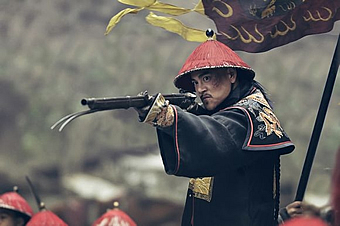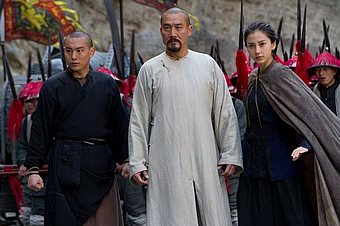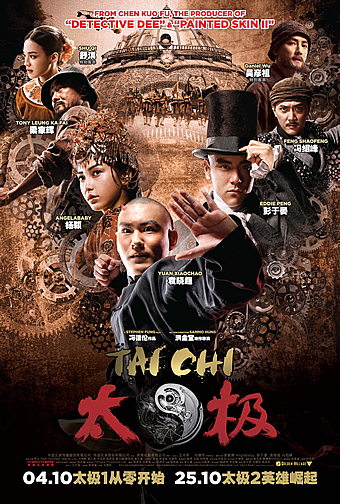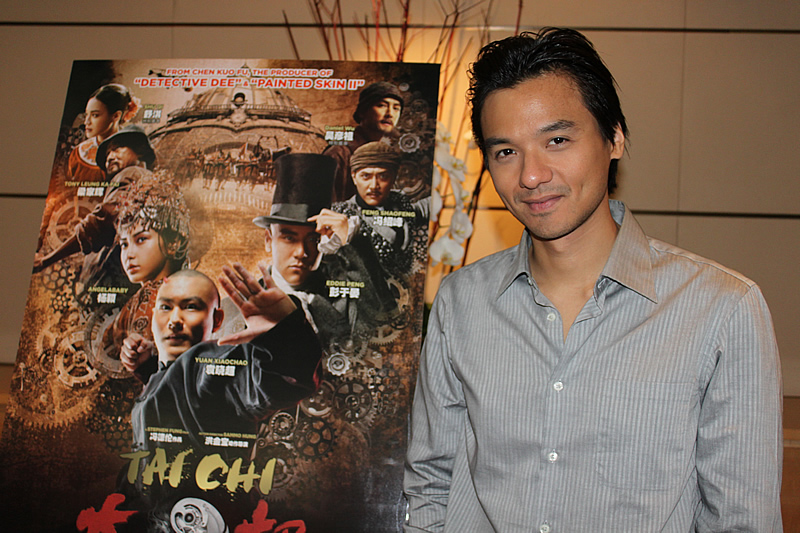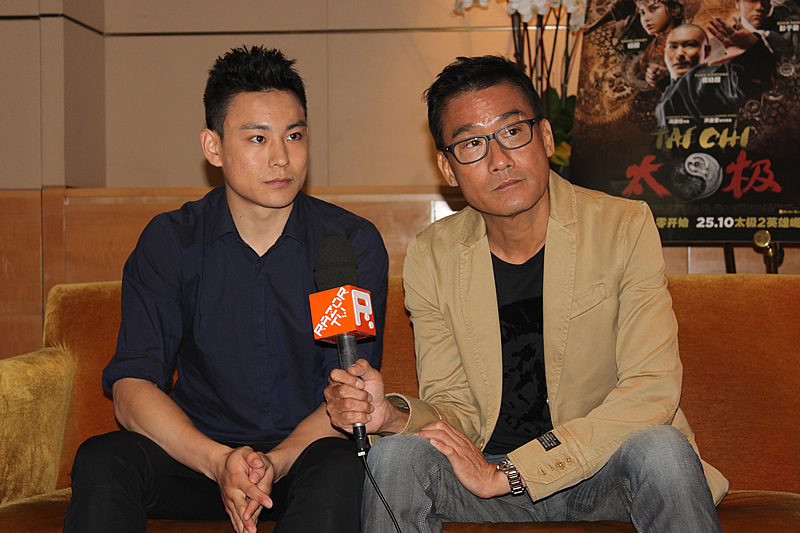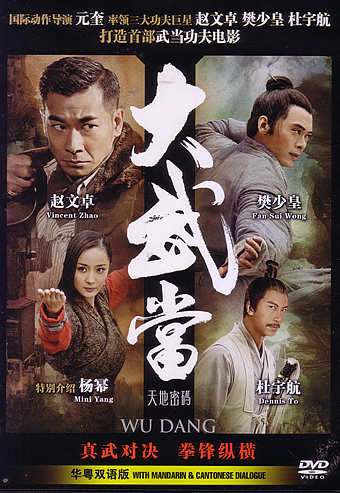TAICHI HERO (太极2英雄崛起) (2012)
Genre: Martial-Arts
Director: Stephen Fung
Cast: Jayden Yuan Xiao-Chao, Tony Leung Ka Fai, Eddie Peng, Angelababy, Feng Shaofeng, Nikkie Shie, Stanley Fung, Xiong Xin Xin, Yuen Biao, Daniel Wu, Peter Stormare
Runtime: 1 hr 39 mins
Rating: PG
Released By: Golden Village Pictures
Official Website:
Opening Day: 25 October 2012
Synopsis: During Yang Luchan's wedding to Yuniang, her brother Zaiyang returns from self-imposed exile with his new bride. He has mastered an elaborate form of martial arts that amazes the awestruck villagers. Only Master Chen can sense something astray, and refuses to welcome his curiously dressed son.
Zaiyang reminds the villagers of a local superstition. 300 years ago, an unruly monk arrived, claiming that one of their former students was a rapist and thief whose rampage across the countryside was only made possible by their martial arts teaching. The monk presented them with a giant bronze bell, claiming that disaster will befall the village if it ever rings.
The villagers begin to treat Yang differently, with many arguing that he should leave. That night, the 300-year-old bell rings for the very first time, and the villagers turn on Yang. Master Chen defends his son-in-law, but Yang is forced to fight Zaiyang. Yang wins, revealing that the exiled son is a fraud with a suit constructed of tiny robots. Another remote-controlled machine caused the bell to ring on demand.
Zaiyang flees the village with his wife, but soon finds himself in debt and despair when the government forecloses his factory. Fang Zijing proposes a deal: he will pay off Zaiyang's debts but only if he joins forces to control Chen Village. Feng, with an army and a battalion of giant cannons, begins the long march to the village to avenge the death of his lover Claire.
In the meantime, Yang has been studying tai chi from Yuniang every day and every night. The horn upon his head has shrunk and disappeared, leaving him as smart as any man. When Feng and his army arrive outside the village gates, Yang, Yuniang and Master Chen fight them like a whirlwind for the survival of the village, until they are trapped in a valley with no escape.
Master Chen insists that Yang and Yuniang flee to the capital to secure justice while he fights off the forces. Just then Zaiyang appears above them in an extraordinary flying machine, bombing the army's cannons and permitting the newlyweds escape. When they arrive in the capital, they set out to seek the help of a legendary Baguazhang master who is the chef of Royal Prince Chun.
But first Yang must prove his worth, beating eight martial arts masters one-on-one before a meeting is arranged in the royal kitchens. Prince Chun appears and declares that he will only join force against the foreign army and bring justice to the village if Yang can defeat his chef in combat. However, if Yang were to lose, he would instead be cruelly punished...
Movie Review:
The ‘wink wink, nudge nudge’ tone is still there, but ‘Tai Chi Hero’ – intended to be viewed with ‘Tai Chi Zero’ as two parts of a complete movie – is thankfully so much better than its predecessor. To be fair, it couldn’t be what it was without ‘Tai Chi Zero’, which had the unenviable task of setting up multiple plot threads involving many different characters, but what makes this second-parter stand out is a considerably more assured and consistent tenor, a surprising amount of heart and some breathtaking action sequences.
Not to worry if you haven’t caught the first instalment, director Stephen Fung does neophytes a favour at the beginning with a brief recap of the key events in ‘Tai Chi Zero’ as the opening credits roll. And from where we left off, Yuniang (Angelababy) has just wedded Yang Luchan (Yuan Xiaochao), whose mental faculties were unfortunately damaged in battle the last time round. Though indebted to Luchan, Yuniang nonetheless is unsettled by her marriage of necessity – and her insecurities are not helped by the return of her eldest brother Zaiyang (Feng Shaofeng).
Regarded as the black sheep of the Chen family, Zaiyang returns from his self-imposed exile with a beautiful but mute wife (Nikkie Shie) in tow in an attempt to make things right with his father and Grandmaster of the village (Tony Leung Kar-Fai). The latter isn’t at all convinced – and for good reason, revealed only in a sepia-toned flashback much later in the movie – so Zaiyang resorts to rehashing an old legend to divide the rest of the superstitious villagers against Luchan.
You can pretty much guess that Zaiyang and his father will make up at some point in the movie, but Fung and his screenwriters Cheng Hsiao-tse and Zhang Jialu turn what could easily have been clichéd into something genuinely affecting. Not only do they tie the reason for the familial discord to the pervasive steampunk influences evident throughout the film, they also parlay the reconciliation between father and son into a poignant lesson on parental expectations and ultimately acceptance.
Even more surprisingly, the rift that Zaiyang tries to create between the villagers and Luchan serves as a prescient reflection of today’s increasingly xenophobic society, where more and more lines are drawn between ‘us’ and ‘them’. The reference might not have been intended, but one certainly could draw similarities to the rift in Hong Kong between native Hongkongers and Mainland Chinese, or even that between locals and foreigners right here in Singapore, and draw lessons on the importance of open-mindedness.
While Luchan fends off the resentment from his fellow villagers, Fung puts into place the pieces leading up to the climactic showdown. Defeated and disgraced, Zijing (Eddie Peng) is given a new lease of life by Duke Fleming (Peter Stormare) from the East India Company. Using the riches of the EIC, Zijing buys the position of Deputy Governor, and exploits that sham authority to launch a full-scale attack on the Chen village – though with Troy No 1 decimated, Zijing only has the more commonplace guns and cannons to boast of.
That’s not to say that there isn’t some fancy contraception in the elaborately staged and exhilaratingly executed sequence that pits the numbers and firepower of Zijing’s troops against Master Chen, Yuniang and Luchan. We’ll not spoil the surprise here – suffice to say that the screenplay cleverly reverses the technological advantage that Zijing once had against the Chens. To Fung’s credit, that sequence demonstrates his ability to conjure big-budget spectacle and easily puts him in the league of Tsui Hark – not of course without some generous help from his team of cinematographers (Ngor Chi-kwan, Lai Yiu-fai and Du Jie) and editors (Cheng Hsiao-tse, Matthew Hui, Zhang Jialu and Zhang Weili).
Fung also impresses with a more intimate but no less exciting climax staged between Luchan and Master Lin, whom Master Chen implores Luchan to seek help from. In case you’re wondering, the latter is a new character played by no less than Yuan Biao himself – and the veteran kungfu actor clearly relishes the opportunity to return to his heydays playing the formidable martial arts exponent. While not as awe-inspiring as Sammo Hung’s tabletop duel with Donnie Yen in ‘Ip Man 2’ (which Tony Leung made a comparison to during the press tour earlier this month), it is nonetheless one of the best martial arts sequences in a while.
Credit here must go to action director Sammo Hung, who stages this climatic bout with style, energy and creativity. Especially beautiful in this sequence is how each of the moves reference something happening in the background (note – we have been suitably brief in our description here to avoid any spoilers) and echoes the very spirit of ‘tai chi’ that the movie espouses. Hung’s achievement of course is more than this sequence alone, and his work here on each and every one of the action scenes is consistently impressive – which is a lot more than we can say of his fellow peers in their more recent works (e.g. Corey Yuen’s in ‘Wudang’).
The same compliments also extend to the cast, who are considerably more comfortable with their roles the second time round. Xiaochao doesn’t look perpetually perplexed anymore, and even manages to ace some of the more nuanced scenes. No longer just a pretty face, Angelababy surprises with her mastery of the martial arts, and holds her own against the athletically-trained Xiaochao. But the real standout here is Tony Leung, who not only handles the wirework convincingly, but also brings dramatic heft to his turn as a father heartbroken by the perceived incompetence of his child.
And with Fung intending for ‘Tai Chi’ to be a trilogy rather than a duo-logy, this movie sets up another – and what promises to be an even more spectacular – showdown between the East India Company and the Chen village. Though it isn’t as open-ended as how ‘Tai Chi Zero’ left off, the wait for that resolution will definitely be longer – since Fung has mentioned that part three is yet to be scripted. Nonetheless, Fung can rest easy – ‘Tai Chi Hero’ gives real weight to his genre-defying franchise by being thrilling, humourous and affecting.
So pleasantly surprised at the results of ‘Tai Chi Hero’ that we’d also like to urge all those who happened to be less than impressed with ‘Tai Chi Zero’ to give Stephen Fung’s bold experiment another try. It might have taken two movies for him to do it, but ‘Tai Chi Hero’ finally shows him successfully combining the elements of the traditional kungfu movie with new-age East-West elements of steampunk, punk rock and video game stylistics. Coupled with gorgeous production design from Yip Tin-Nam and a lush and lively score from Japanese composer Katsunori Ishida, ‘Tai Chi Hero’ turns what could have been a zero-sum game into a winning shot at creating one of the most definitive franchises in modern Chinese cinema.
Movie Rating:





(Rebounding from ‘Zero’, this ‘Tai Chi Hero’ is a winning genre-bending combination of thrilling kungfu, tongue-in-cheek humour and poignant father-son bonding)
Review by Gabriel Chong
You might also like:

Movie Stills

